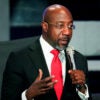One of the true cornerstones of American exceptionalism is the First Amendment.
But the free speech protection that the First Amendment provides is not just legal—it’s cultural, it’s been ingrained into who we are as a people.
This is why the results of a recent Brookings Institution study about free speech views on college campuses are so worrying for our future.
The Daily Signal depends on the support of readers like you. Donate now
The study, which gauged the level of support and understanding college students have of the First Amendment, uncovered some worrying results.
For instance, when asked whether the First Amendment protects “hate speech,” only 39 percent of those who responded to the survey said “yes” and 44 percent said “no.” Sixteen percent said they “didn’t know.”
The survey also found that a majority of students agreed that it was acceptable to shout down a speaker who is “known for making offensive and hurtful statements.”
And perhaps most disturbing of all, nearly 20 percent of respondents said it was OK to use violence to stop a controversial speaker from speaking.
Given the findings of this study, it should be no wonder why there have been so many incidents with speakers on college campuses.
It would seem that those who go through our universities should be the most supportive of open discussion. After all, isn’t that what these schools, to a certain extent, are supposed to be about?
Yet, the supposedly best and brightest who attend our nation’s colleges either oppose or completely misunderstand the most fundamental aspects of our First Amendment rights.
“I would hope that we can do a better job at convincing current and future college students that the best way to respond to offensive speech is with vigorous debate, or peaceful protest—and not, as many seem to believe, with violence,” said the professor who conducted the study, John Villasenor.
This would certainly be good advice, but it’s a lesson that is perhaps not getting through in 2017.
While a significant percentage of students may still support free speech, they are losing a battle against radicals who are trying to shut it down.
On campuses, speakers are frequently silenced, and by increasingly violent agitators who are using the “heckler’s veto” to shut up opposing voices.
This recently happened at the University of California, Berkeley, where conservative commentator Ben Shapiro’s event was accosted by left-wing protesters who wanted to shut him down.
While Shapiro was still able to speak, there is now immense pressure to shut down conservative lecturers who have been shut down around the country. And this is happening at a faster pace.
A Foundation for Individual Rights in Education, or FIRE, study found that the number of incidents on campus and “disinvitations” to conservative speakers is rapidly increasing. And this trend of smashing those with whom you disagree is spilling out of college campuses into our everyday lives with horrifying results.
This tide can only be stemmed by a culture that values free expression and is willing to protect it, by force if necessary.
Freedom of speech is already challenged on college campuses by both radicals who want to shut it down in the name of political correctness, and administrations that constrict it through unconstitutional speech codes.
The Founding Fathers created a country in which they hoped free speech would be protected. While that standard has morphed, changed, and sometimes been besieged over time, it has generally grown to become a value shared by all Americans.
A cultural shift away from supporting speech today will have terrible long-term consequences for the country, especially if that change is coming from people who soon may be in positions of power and leadership.






























